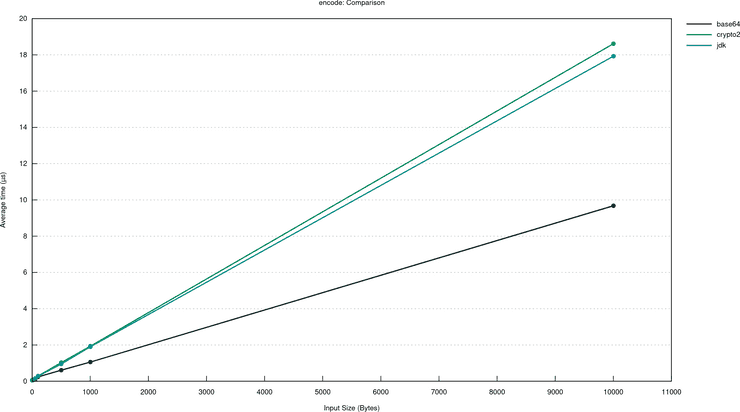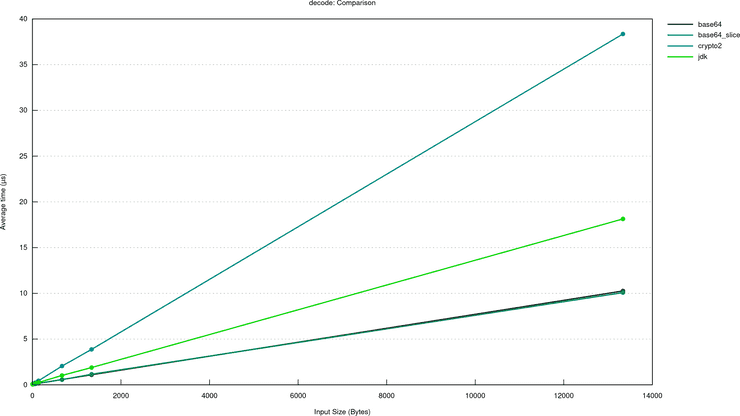UPD: A lot of interesting comments on reddit:
- Added benchmarks for data-encoding crate.
- Added an optimized version of JDK ported implementation that brings Rust closer to JVM for encoding.
- WOW. Merged PR using base64-simd crate, which performance is almost 10x better than anything else!
- Blog post remains the same, if you curious about new numbers: check it here and here.
I got curious… Not that’s something new to me. But a bit unusual thought after benchmarking Base64 performance in Java: what is the maximum performance in unmanaged world? And since I wanted to explore Rust a bit, I decided that it’s a good opportunity!
I went to google to find something about benchmarking base64 encoding performance for Rust and stumbled upon a github issue saying that crate base64 isn’t that fast. That opened an opportunity for me to check it.
What Are We Benchmarking?
- base64 crate.
- Base64 encoding/decoding from crypto2 crate. Sadly, it’s not published so I had to copy-paste its code for benchmarking.
- java.util.Base64: I ported implementation from Java to Rust for benchmarking purposes.
And then I want to compare it with the results of JVM benchmarks on the same inputs.
For benchmarking Rust I used criterion.rs, a very nice tool for benchmarking. It does much more out of the box than JMH. The hardware configuration is Intel® Core™ i7-1165G7 @ 2.80GHz × 8 (4 core + 4 HT) with 16 GB RAM.
Benchmarks
Here are couple of graphs for Rust only, generated by Criterion: for encode and decode performance. base64 implementation is a clear winner here for both encoding and decoding.
Performance of encoding for different input data sizes.
Performance of decoding for different input data sizes.
For the decoding you may notice that I benchmarked 2 methods from base64: decode_config and decode_config_slice. The reason is that they have a bug in their implementation: decode_config allocates significantly more memory than it’s needed. But the difference in terms of performance is very small (around 10%). It was fixed, but not in the most efficient way, and still not published.
Versus Java
Let’s compare performance for 1K input Rust vs Java: and immediately — WOW!
For encoding Java performs better than Rust O_O:
method input output avg time
base64::encode_config 1002 1336 1078
crypto2::encode_with_config 1002 1336 1977
jdk::encode 1002 1336 1913
j.u.Base64.Encoder 1002 1336 872And even ported almost 1-to-1 implementation is 2 times slower than Java.
For decoding everything looks normal: ported implementation has comparable performance and Rust’s implementation is about 2 times faster than Java.
method input output avg time
base64::decode_config 1336 1002 1163
base64::decode_config_slice 1336 1002 1075
crypto2::decode_with_config 1336 1002 4014
jdk::decode 1336 1002 1985
j.u.Base64.Decoder 1336 1002 1930And the full table for different input sizes:
method input output avg time
base64::encode_config 12 16 76
base64::encode_config 51 68 120
base64::encode_config 102 136 184
base64::encode_config 501 668 584
base64::encode_config 1002 1336 1078
crypto2::encode_with_config 12 16 67
crypto2::encode_with_config 51 68 145
crypto2::encode_with_config 102 136 274
crypto2::encode_with_config 501 668 1101
crypto2::encode_with_config 1002 1336 1977
jdk::encode 12 16 70
jdk::encode 51 68 138
jdk::encode 102 136 262
jdk::encode 501 668 1004
jdk::encode 1002 1336 1913
j.u.Base64.Encoder 12 16 46
j.u.Base64.Encoder 51 68 86
j.u.Base64.Encoder 102 136 128
j.u.Base64.Encoder 501 668 446
j.u.Base64.Encoder 1002 1336 872
base64::decode_config 16 12 85
base64::decode_config 68 51 119
base64::decode_config 136 102 174
base64::decode_config 668 501 584
base64::decode_config 1336 1002 1163
base64::decode_config_slice 16 12 76
base64::decode_config_slice 68 51 152
base64::decode_config_slice 136 102 165
base64::decode_config_slice 668 501 586
base64::decode_config_slice 1336 1002 1075
crypto2::decode_with_config 16 12 96
crypto2::decode_with_config 68 51 239
crypto2::decode_with_config 136 102 442
crypto2::decode_with_config 668 501 1934
crypto2::decode_with_config 1336 1002 4014
jdk::decode 16 12 75
jdk::decode 68 51 150
jdk::decode 136 102 254
jdk::decode 668 501 1007
jdk::decode 1336 1002 1985
j.u.Base64.Decoder 16 12 53
j.u.Base64.Decoder 68 51 128
j.u.Base64.Decoder 136 102 231
j.u.Base64.Decoder 668 501 977
j.u.Base64.Decoder 1336 1002 1930Conclusion
An unexpected result of Java outperforming Rust in encoding will please Java users :) Even though it’s totally possible for Java to outperform unmanaged code, it’s a rare case. Let’s celebrate :)
I liked the opportunity to compare Java versus Rust. I rarely cross boundaries of my main platform (Scala, JDK). I will probably do it more in the future.
Full criterion report is here. Source code is on GitHub. Originally posted on Medium. Cover image by Clker-Free-Vector-Images from Pixabay (plus my gimp madskillz).

